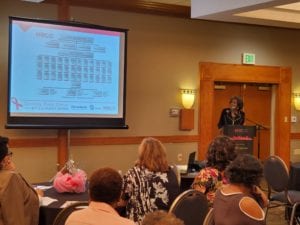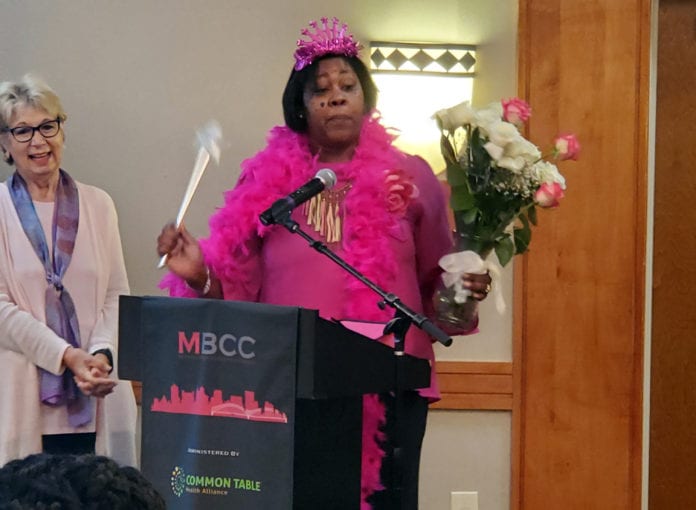The takeaways were many and varied as survivors and advocates gathered Tuesday morning to celebrate the sacrifices of time and resources by family members who stand alongside breast cancer patients.
“Surviving Breast Cancer: It’s A Family Affair” was a learning collaborative open to the public and held at the DoubleTree by Hilton Hotel in East Memphis. What a kickoff to Breast Cancer Awareness Month 2019.

The Memphis Breast Cancer Consortium (MBCC) brought scores of women out — some dressed in the widely recognized color of pink — to share stories and exchange information regarding the treatment of breast cancer.
“There is really no reason whatsoever that women in Shelby County do not get yearly mammograms,” said Project Director Carla Baker of the MBCC. “Not when you have Baptist Hospital mobile unit and the West Clinic mobile unit going out in these communities. There should be a line wrapped around these trucks instead of lines wrapped around food trucks.”
Joanne Dishmon Gibbs shared personal insight of how the family rallied around her brother after his breast cancer diagnosis.
“It is not as common as women having breast cancer, but men can be diagnosed with it, too,” said Gibbs. “As a family, we prayed and we prayed for him. We all just did what we could to be there for him. Taking him to doctors’ appointments and being there with him for his treatments.
“You just cannot make this journey by yourself. Breast cancer really is an affair that involves the whole family.”
Judy Seals-Togbo, survivor-turned-advocate for breast cancer patients, recounted her own bout with breast cancer 25 years ago and how her mother helped to care for her during that time.
“My mother really wasn’t well, herself, but she wanted to help. She wanted to do something and insisted on driving me back and forth to my doctors’ visits and treatments. And so, I let her. It was important for her to feel like she was helping me,” Seals-Togbo said.
“As a mother, that made her feel good, like she was contributing to my healing and well-being. Not only is family support necessary, but support groups like ‘Carin and Sharin’ can be just like family. They saved my life.”
Experienced caregivers in the audience extended advice to other caregivers.
“For a man, it is especially hard,” said Gibbs. “They are generally diagnosed at a later stage because no one looks for breast cancer in men. Men are used to being strong and in charge, so the psychological impact is devastating. He will have some angry days. Let them be angry.
“Let people have a bad day. Just be there to listen. Be an active and engaged, caring listener.”
Dr. Fedoria Rugless, director of research at the Church Health Center and a University of Memphis assistant professor, cited the 2:1 mortality ratio of African-American women to Caucasian women in Shelby County.
“Memphis is number one on so many lists that we don’t want to even be on,” said Rugless. “Our mortality rate is still 33 percent higher than Caucasian women. Poverty and access are two vital factors. But also, education is needed. There are myths and misinformation that are prominent factors in preventing women from seeking treatment.”
A national study in 2009 found that Memphis had the worst breast cancer disparities gap between African-American and Caucasian women. Today, Memphis is seventh on that list.
Jeremy Sanders of the West Cancer Center Research Institute was the lone, male speaker.
“Not only do we conduct mammograms, but we also have programs for women who are uninsured. Treatment in lymphodema, prostheses — we have a variety of services for women who are uninsured or underinsured,” Sanders said.
“There is no reason that women should go without everything they need to treat breast cancer. All of the excuses have been taken away.”
About the MBCC
- MBCC is a Common Table Health Alliance (CTHA) community partnership designed to bring together organizations and individuals committed to the fight against breast cancer inequalities in Memphis and Shelby County.
- In 2016, the AVON Breast Cancer Crusade provided seed funding to form the MBCC.
- The collaborative is concerned with such areas as: Awareness, Access to Care, Patient Services, Community-facing Events, Treatment, Quality of Care, Data Sharing, and Quality Improvement.




